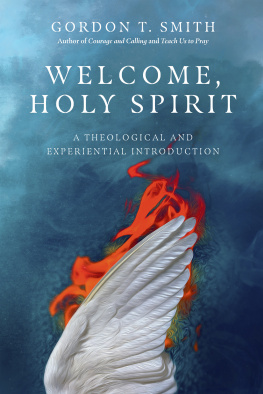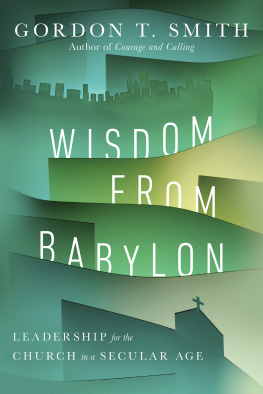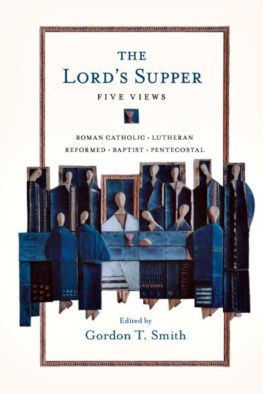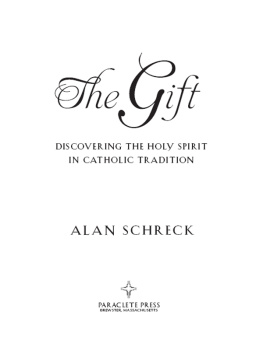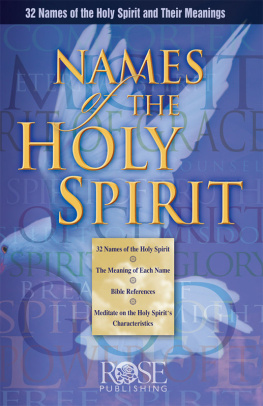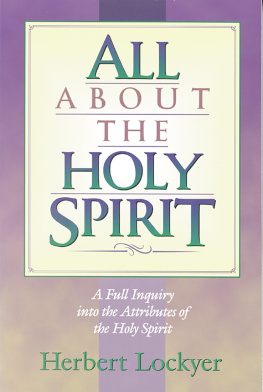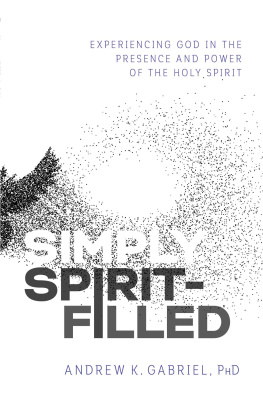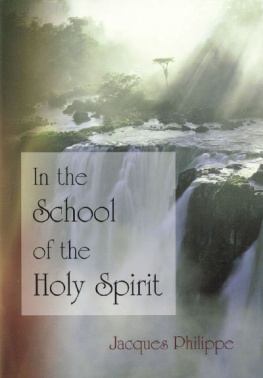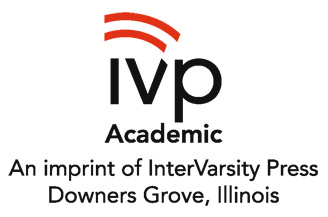GORDON T. SMITH
2021 by Gordon T. Smith
All rights reserved. No part of this book may be reproduced in any form without written
permission from InterVarsity Press.
InterVarsity Press is the book-publishing division of InterVarsity Christian Fellowship/USA, a movement of students and faculty active on campus at hundreds of universities, colleges, and schools of nursing in the United States of America, and a member movement of the International Fellowship of Evangelical Students. For information about local and regional activities, visit intervarsity.org.
Scripture quotations, unless otherwise noted, are from the New Revised Standard Version Bible, copyright 1989 National Council of the Churches of Christ in the United States of America. Used by permission. All rights reserved worldwide.
The publisher cannot verify the accuracy or functionality of website URLs used in this book beyond the date of publication.
Introduction
W HAT DOES IT MEAN TO SAY, in the words of the Nicene Creed, I believe in the Holy Spirit? More specifically, what does it mean to declare all that is included in the affirmation, I believe in the Holy Spirit, the Lord and Giver of life, who proceeds from the Father and who with the Father and the Son together is worshiped and glorified, who spoke through the prophets?
What does it mean to be truly trinitarianaffirming Father, Son, and Spiritin our faith, worship, Christian life, and witness? And what does it mean that we believe that the Spirit is the Lord, the Giver of life?
Answering these questions is not easy; this is complicated territory that challenges us intellectually and experientially. Thomas Oden has noted that no subject of Christian teaching is more prone to fanaticism and novelty and subjectivism than the Holy Spirit.... The work of the Spirit deserves especially careful attention precisely because it is so prone to subjective manipulation and ideological abuse.
This is a sobering observation, yet we cannot avoid the question of what it means to believe in the Holy Spirit because it matters too much. There is no other way to live the Christian life except in the fullness of the Spirit. There is no other way to be the church except in the fullness of the Spirit. There is no other way to be the church on mission except in the grace and power of the Spirit. And there is no other way to worship and pray except in the Spirit (Ephesians 6:18). We have so much to gain and nothing to lose by developing the theological and experiential capacity to fully embrace the life and ministry of the Spiritto be attentive to the presence of the Spirit in the church, in the world, and in our personal life, work, and ministry.
Critical reflection on the person and ministry of the Spirit can be an encouraging and hope-filled exercise, but we need to be discerning. Oden is right; this can go wrong. For our own sake and for the sake of the church and the world, we need to get this right, and this means learning the art of discernment. We need to find the life-giving dynamic captured in 1 Thessalonians 5, when the apostle urges his readers on the one hand to not quench the Spirit (v. 19), but then quickly adds: but test everything (v. 21). This is our objective: to approach this critical and essential topic with open hearts and eager minds but also with careful thought, willing to ask hard questions that in the end strengthen the life of the church and our own experience of the Holy Spirit. We can turn from both cynicism and naivet; we can be theologically astute and eager to live in the grace of the Spirit.
This requires that we ask the right questionsmost notably four foundational questions about the Holy Spirit, each of them regarding how the Spirit relates to something else. First and foremost, we ask: What is the relationship between the Spirit and Christ? As part of that question, we ask what it means to confess the Holy Spirit as one with the Father and the Son within the Holy Trinity.
Second, we ask: What is the relationship between the Spirit and the created order? This includes asking about the relationship between the Spirit and the world (the cosmos), and the relationship between the Spirit and materialitythe physicality of the created order.
Third, we ask: What is the relationship between the Spirit and the Wordthat is, the Scriptures?
And fourth, we ask: What is the relationship between the Spirit and the church?
In so many respects, our doctrine of the Holy Spiritour pneumatologycomes down to these four questions. Thus, for example, if you were to try to get a read on the pneumatology of a particular Christian tradition or denomination, you could ask these four questions. A pneumatology that is faithful to the biblical witness and the creedal heritage of the church will give attention to each of these. All four of them need to arise at some point in our reflections on the person and ministry of the Holy Spirit, but the first is the most critical. Nothing in our understanding of the Spirit is on track if we are not clear about the relationship between the Spirit and Christ. To this end, it is helpful to think of what follows through two images: the compass and the boundary. The compass speaks of the need for clarity about our directionwe need to be clear on our true north. The boundarya metaphor from the soccer fieldspeaks of what it means to be truly in bounds.
The compass is Christ. Christ Jesus is the north star; he is the author and finisher of our faith. Thus, we keep our eyes on him. Hans Urs von Balthasar expresses this well when he writes: We must bear in mind... that our participation in the Spirit always remains conditioned through the Son sent to us by the Father, the Son of Man who died on the Cross and rose from the realm of the dead and who pours himself out forever to the Church in the Eucharist to prove the Fathers love. The first epistle of John stresses that we are not to trust every spirit but test the spirits, and the key evidence is that the spirit that comes from God acknowledges that Jesus Christ has come in the flesh. Thus, the compass for our reflections will be the incarnate, crucified, risen, and ascended Lord. It is not our projections of Christ, but the Christ who is the embodied, suffering, and ascended Lamb.
This point cannot be overstated. Many Christian communities have what would seem to be a powerful emphasis on the ministry of the Spirit and insist that they are Christ-centered. Yet frequently the Christ of whom they speak is a spiritized Christnot the incarnate, crucified, and ascended Lord. Thus, we must insist that the reference point for the ministry of the Spirit is the Christ who is revealed in the Scriptures.
If the compass is Christ, the boundaries of the playing field are what we mean to speak of God as both one and triune. We need to stay within the ancient creedal witness to the triunity of God, and also need to consider some of the ancient trinitarian heresies and note how remarkably relevant they are today.

